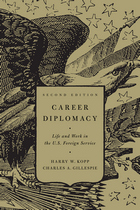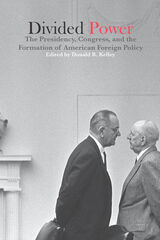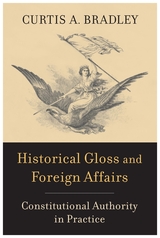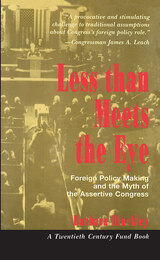
The U.S. Foreign Service is sometimes derided, often underappreciated, occasionally praised, rarely examined, and almost never understood. And yet whether America's diplomacy succeeds or fails depends to a large extent on its foreign service professionals. Career Diplomacy is an insider's guide that examines the foreign service as an institution, a profession, and a career.
Harry W. Kopp and Charles A. Gillespie, both of whom had long and distinguished careers in the foreign service, provide a full and well-rounded picture of the organization, its place in history, its strengths and weaknesses, and its role in American foreign affairs. Based on their own experiences and through interviews with over 85 current and former foreign service officials, the authors lay out what to expect in a foreign service career, from the entrance exam through midcareer and into the senior service—how to get in, get around, and get ahead.
The book concludes with a stirring chapter on tomorrow's diplomats and the future of the foreign service as an institution. Readers will benefit from several appendices, which include a Department of State organization chart, core precepts of the foreign service, and internet resources.
Career Diplomacy reveals what America's professional diplomats do and how they do it. It is a rare, first-hand look in to the life and work of this country's professional diplomats, who advance and protect U.S. national security interests around the globe.

Career Diplomacy—now in its second edition—is an insider's guide that examines the foreign service as an institution, a profession, and a career. Harry W. Kopp and Charles A. Gillespie, both of whom had long and distinguished careers in the foreign service, provide a full and well-rounded picture of the organization, its place in history, its strengths and weaknesses, and its role in American foreign affairs. Based on their own experiences and through interviews with over 100 current and former foreign service officers and specialists, the authors lay out what to expect in a foreign service career, from the entrance exam through midcareer and into the senior service—how the service works on paper, and in practice.
The second edition addresses major changes that have occurred since 2007: the controversial effort to build an expeditionary foreign service to lead the work of stabilization and reconstruction in fragile states; deepening cooperation with the U.S. military and the changing role of the service in Iraq and Afghanistan; the ongoing surge in foreign service recruitment and hiring at the Department of State and U.S. Agency for International Development; and the growing integration of USAID’s budget and mission with those of the Department of State.

Career Diplomacy is an insider's guide to the Foreign Service as an institution, a profession, and a career. In this thoroughly revised third edition, Kopp and Naland provide an up-to-date, authoritative, and candid account of the life and work of professional US diplomats, who advance and protect this country’s national security interests around the globe. The authors explore the five career tracks—consular, political, economic, management, and public diplomacy—through their own experience and through interviews with more than a hundred current and former members of the Foreign Service. They lay out what to expect in a Foreign Service career, from the entrance exam through midcareer and into the senior service—how to get in, get around, and get ahead.
New in the third edition: • A discussion of the relationship of the Foreign Service and the Department of State to other agencies, and to the combatant commands • An expanded analysis of hiring procedures• Commentary on challenging management issues in the Department of State, including the proliferation of political appointments in high-level positions and the difficulties of running an agency with employees in two personnel systems (Civil Service and Foreign Service) • A fresh examination of the changing nature and demographics of the Foreign Service


A new interpretation of the constitutional law of foreign affairs, as it has been developed throughout its history by presidents and by Congress.
In the more than 230 years since the Constitution took effect, the constitutional law governing the conduct of foreign affairs has evolved significantly. But that evolution did not come through formal amendments or Supreme Court rulings. Rather, the law has been defined by the practices of Congress and the executive branch, also known as “historical gloss.”
Curtis A. Bradley documents this process in action. He shows that expansions in presidential power over foreign affairs have often been justified by reference to historical gloss, but that Congress has not merely stepped aside. Belying conventional accounts of the “imperial presidency” in foreign affairs, Congress has also benefited from gloss, claiming powers for itself in the international arena not clearly addressed in the constitutional text and disrupting claims of exclusive presidential authority.
Historical Gloss and Foreign Affairs proposes a constitutional theory that can make sense of these legal changes. In contrast, originalist theories of constitutional interpretation often ignore influential post-Founding developments, while nonoriginalist theories tend to focus on judicial decisions rather than the actions and reasoning of Congress and the executive branch. Moreover, the constitutional theories that do focus on practice have typically emphasized changes at particular moments in time. What we see in the constitutional law of foreign affairs, however, is the long-term accumulation of nonjudicial precedents that is characteristic of historical gloss. With gloss confirmed as a prime mover in the development of foreign affairs law, we can begin to recognize its broader status as an important and longstanding form of constitutional reasoning.

What Hinckley reveals is sharply at odds with conventional wisdom and unflattering to both the executive and the legislative branches of government. More than a critical reassessment, this book also proposes reforms than might result in real congressional participation in the making of foreign policy. With its insight into how our system of checks and balances works—and doesn't—this book takes a first step toward making the peoples' representatives accountable for crucial American interests in foreign matters.
READERS
Browse our collection.
PUBLISHERS
See BiblioVault's publisher services.
STUDENT SERVICES
Files for college accessibility offices.
UChicago Accessibility Resources
home | accessibility | search | about | contact us
BiblioVault ® 2001 - 2024
The University of Chicago Press









